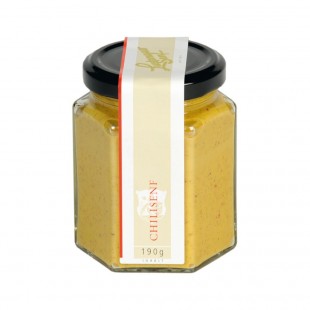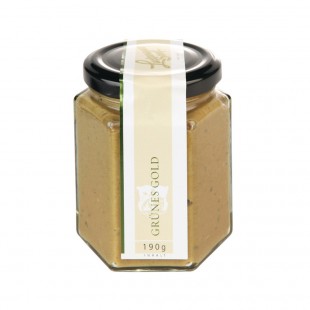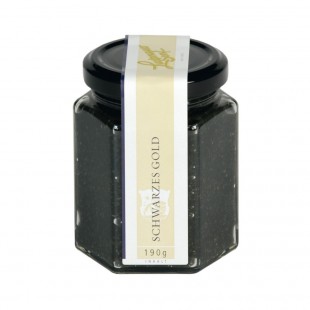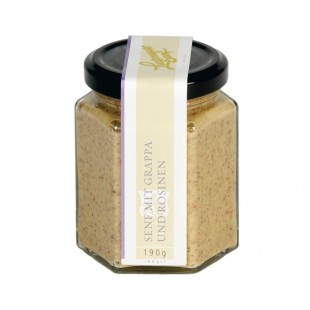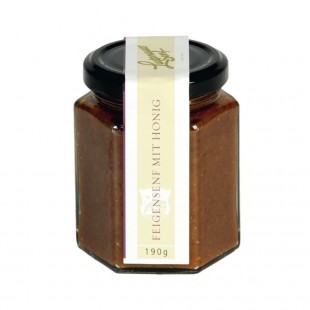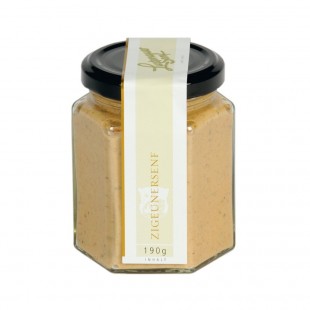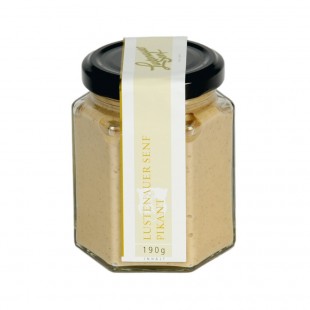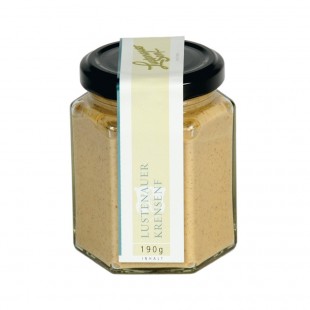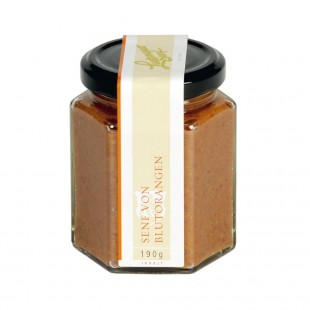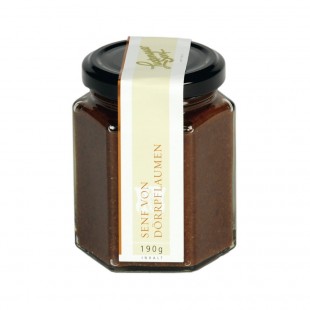No products
Mustard is arguably one of the oldest known plants used for the refinement of food. When it produces a high quality standard, it is undoubtedly also a delicacy. Mustard was used thousands of years ago in China and was mainly used there, although it was discovered about 400 BC. in Greece, where mustard was popular mainly because of its medical properties.
In 1st century AD, a Roman developed the first mustard pastry recipe. When mustard then gained notoriety in Europe in the 8th century AD, it became one of the most sought after in hot spices. Mustard is a healthy supporter of the stomach and bile formation and promotes fat and protein utilization.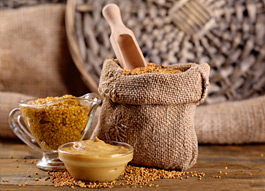
For the production of mustard, the sheet ropes of the mustard plant is gently harvested, which is one of the cruciferous plants. The seeds of the plant contain essential oils that contain the sharp mustard flavor. Well protected by the seeds coat, the essential oils occur only when grinding them out and are then used for the production of classic mustard or mustard sauces. High quality mustard is always prepared with particularly good mustard seeds. For different tastes and individual prescriptions, other natural flavorings such as vinegar, salt, wine or cider and spices are used in the production.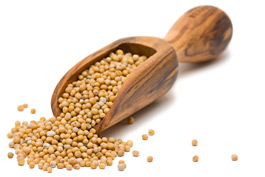
Dijon mustard
As the two most important types of production one refers to processing is in the Dijon-type and Bordeaux-type.
Dijon-type mustard is caused by a course of grinding and sieving mustard seeds either (brown or black) with a hot vinegar mass which is then refined to an individual spice recipes of Dijon-type mustard.
Bordeaux-type
Bordeaux type mustard is contrast in producing, for example, it is prepared with either (white and black) mustard seeds by adding wine, water and spices in a two-stage process, ground to a smooth paste. In this respect, Dijon mustard is coarser than the smooth mustard commonly used.
The quality of mustard is exclusively dependent on the high-quality use of ingredients as in all dishes. A good mustard is a taste experience and is very well suited for the refinement of many dishes. Treat yourself to a special taste of good mustard that can be used for diverse and innovative sauce creations that are used to refine your food.
Mustard is arguably one of the oldest known plants used for the refinement of food. When it produces a high quality standard, it is undoubtedly also a delicacy. Mustard was used thousands of years ago in China and was mainly used there, although it was discovered about 400 BC. in Greece, where mustard was popular mainly because of its medical properties.
In 1st century AD, a Roman developed the first mustard pastry recipe. When mustard then gained notoriety in Europe in the 8th century AD, it became one of the most sought after in hot spices. Mustard is a healthy supporter of the stomach and bile formation and promotes fat and protein utilization.
For the production of mustard, the sheet ropes of the mustard plant is gently harvested, which is one of the cruciferous plants. The seeds of the plant contain essential oils that contain the sharp mustard flavor. Well protected by the seeds coat, the essential oils occur only when grinding them out and are then used for the production of classic mustard or mustard sauces. High quality mustard is always prepared with particularly good mustard seeds. For different tastes and individual prescriptions, other natural flavorings such as vinegar, salt, wine or cider and spices are used in the production.
Dijon mustard
As the two most important types of production one refers to processing is in the Dijon-type and Bordeaux-type.
Dijon-type mustard is caused by a course of grinding and sieving mustard seeds either (brown or black) with a hot vinegar mass which is then refined to an individual spice recipes of Dijon-type mustard.
Bordeaux-type
Bordeaux type mustard is contrast in producing, for example, it is prepared with either (white and black) mustard seeds by adding wine, water and spices in a two-stage process, ground to a smooth paste. In this respect, Dijon mustard is coarser than the smooth mustard commonly used.
The quality of mustard is exclusively dependent on the high-quality use of ingredients as in all dishes. A good mustard is a taste experience and is very well suited for the refinement of many dishes. Treat yourself to a special taste of good mustard that can be used for diverse and innovative sauce creations that are used to refine your food.
Mustard There are 10 products.
-
Out of stock
Lustenauer Mustard - Chili 190g Lustenauer Mustard - Chili 190g
Forget everything you've heard about chili mustard. This is the hottest mustard you've ever tasted. Forget everything you've heard about...
9,90 € tax incl. excl. shipping unit price: 57,32 € per 1KgDelivery: 5-10 working days -
Lustenauer Mustard - Green Gold 190g Lustenauer Mustard - Green Gold 190g
Mustard with roasted pumpkin seeds and pumpkin seed oil. Mustard with roasted pumpkin seeds...
9,90 € tax incl. excl. shipping unit price: 57,32 € per 1KgDelivery: 5-10 working days -
Out of stock
Lustenauer Mustard - Black Gold 190g Lustenauer Mustard - Black Gold 190g
A bold creation, grapeseed oil, sweet cider (“Apfelsüßmost”), balsamic vinegar, mustard seeds, raw cane sugar, salt and a pinch of activated carbon as icing on the cake. A bold creation, grapeseed oil, sweet...
9,90 € tax incl. excl. shipping unit price: 57,32 € per 1KgDelivery: 5-10 working days -
Out of stock
Lustenauer Mustard - with Grappa and raisins 190g Lustenauer Mustard - with Grappa and raisins 190g
Again, something unusual for our connoisseurs. Coarse-grained milled mustard from black mustard seeds, vinegar, salt, sugar and spices. Again, something unusual for our...
9,90 € tax incl. excl. shipping unit price: 57,32 € per 1KgDelivery: 5-10 working days -
Out of stock
Lustenauer Mustard - Fig with honey 190g Lustenauer Mustard - Fig with honey 190g
Fresh and dried figs, black mustard seeds from Apulia, apple and balsamic vinegar, honey and raw cane sugar. Fresh and dried figs, black mustard...
9,90 € tax incl. excl. shipping unit price: 57,32 € per 1KgDelivery: 5-10 working days -
Out of stock
Lustenauer Gypsy Mustard 190g Lustenauer Gypsy Mustard 190g
We agree – a slightly daring creation: pepper - garlic - herbs and white wine. We agree – a slightly daring...
4,90 € tax incl. excl. shipping unit price: 28,37 € per 1KgDelivery: 5-10 working days -
Out of stock
Lustenauer Mustard - Spicy 190g Lustenauer Mustard - Spicy 190g
The subtil and spicy flavor of this mustard result from the balanced blend of mustard seeds, natural spices and vinegar, from which our “Spicy” is produced The subtil and spicy flavor of this...
4,90 € tax incl. excl. shipping unit price: 28,37 € per 1KgDelivery: 5-10 working days -
Out of stock
Lustenauer Mustard - Horseradish 190g Lustenauer Mustard - Horseradish 190g
Our powerful weapon in the fight against the adapted taste of industrial mustards Our powerful weapon in the fight...
4,90 € tax incl. excl. shipping unit price: 28,37 € per 1KgDelivery: 5-10 working days -
Out of stock
Lustenauer Mustard - Blood orange 190g Lustenauer Mustard - Blood orange 190g
A blend of blood Oranges, raw cane sugar, brown and yellow mustard seeds, white balsamic vinegar, dark couverture (80% cocoa) and a pinch of salt. A blend of blood Oranges, raw cane...
9,90 € tax incl. excl. shipping unit price: 57,32 € per 1KgDelivery: 5-10 working days -
Out of stock
Lustenauer Mustard - Prunes 190g Lustenauer Mustard - Prunes 190g
With this creation, we leave the beaten paths of mustard production. Attempts to combine mustard with fruits are well known. With this creation, we leave the...
9,90 € tax incl. excl. shipping unit price: 57,32 € per 1KgDelivery: 5-10 working days




















